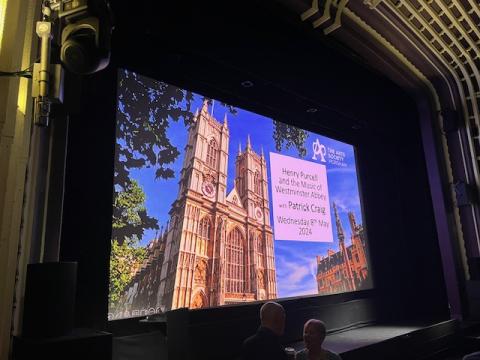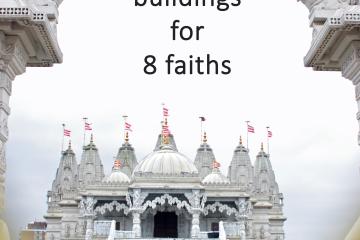The Arts Society Totnes use their Community Grant to support a garden based project with The Breakthrough Transformation Trust in South Devon.
Henry Purcell and the Music of Westminster Abbey
Henry Purcell and the Music of Westminster Abbey
13 May 2024
How does one begin to describe the monastic chants that once filled the sacred hollows of the Medieval Chapter House? Or the joyous sound that bellowed from the organ accompanying the choristers for those coronations in the royal history of the Abbey? In this immersive lecture, Patrick Craig brought it all alive in the auditorium of The Capitol in Horsham for this May lecture of the Horsham Arts Society. We learned about Purcell’s inextricable connection to Westminster Abbey, being born to a father who was Master of Choristers and, of course, how his talent flourished in the royal court of music.
Patrick illustrated the young Purcell’s life empathically, who was only 11 when the Great Fire of London burned through the city, how he might even have witnessed the disaster living in Westminster. The boy was a child genius, developing his knowledge and nurturing his talent from copying and composing music. The fact that he was appointed to the position of Organist of Westminster Abbey at the age of 20 marked him out as a rising star surpassing the talents of his predecessor John Blow and his teacher, Pelham Humfrey.
To truly appreciate Purcell’s talent in the context of time, we were introduced to the early development of music at Westminster Abbey from the Anglo Saxon times to post Reformation, the Restoration, and later King James II and William and Mary. We listened to recordings of verse anthems of court composers through the Baroque period - “Anthem of Jesus” by Orlando Gibbons and a piece by John Blow - “A Hymn to God the Father” to the words of John Donne. This was the moment when time stood still in the auditorium as we were held in the mesmerising beauty of words and music renditioned by Patrick himself, in his countertenor voice! Truly sublime!
In addition to his Organist role, Purcell also held important roles at Westminster Abbey - Director of Music and shared the duties of court composers with John Blow. During this time, Purcell also wrote verse anthems such as “They that go down to the sea in ships”. In 1690, Purcell collaborated in the production of theatre music. His most famous triumphs are of course “Dido and Aeneas” and “The Fairy Queen” based on Shakespeare’s Midsummer Night’s Dream.
Purcell died in 1695 and John Blow composed “An Ode on the death of Henry Purcell” to honour his phenomenal contribution to music. But that was centuries ago! So what of Purcell’s legacy? Is his music still relevant today? Patrick made a most emphatic point when he played a modern version of “Dido’s Lament” produced by Cold Play and sung most beautifully by Helen Charleston. In the video, the words of the song were mimed backwards! It was modern, it was beautiful and yes, relevant for today for it is being enjoyed and discovered by the present generation. One might conclude that Purcell’s music is an ethereal beauty that endures for all times ….
Further reading:
Henry Purcell by Robert King (Thames and Hudson)
Henry Purcell by Maureen Duffy (Fourth Estate)
Purcell Remembered by Michael Burden (Faber and Faber Ltd)
JOIN OUR MAILING LIST
Become an instant expert!
Find out more about the arts by becoming a Supporter of The Arts Society.
For just £20 a year you will receive invitations to exclusive member events and courses, special offers and concessions, our regular newsletter and our beautiful arts magazine, full of news, views, events and artist profiles.
FIND YOUR NEAREST SOCIETY
MORE FEATURES
A Lecture by Charlie Forman on 13 November at The Arts Society Horsham
The Arts Society North Bedfordshire used their Community Grant to support a climate change themed artwork at a local academy.






